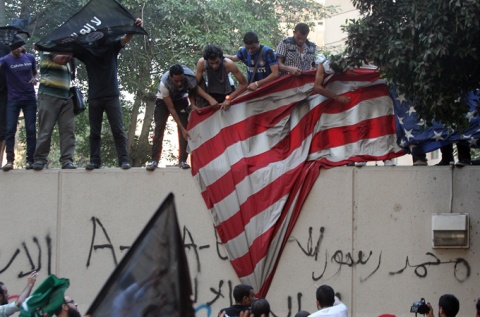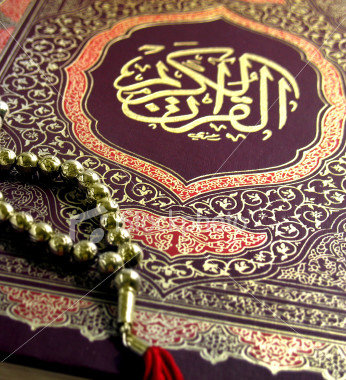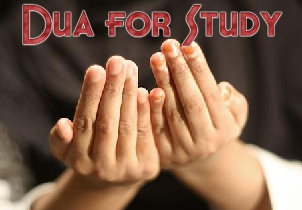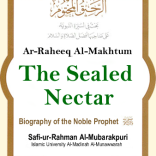Posts Tagged ‘Allah الله’
Ramadan For them Vs Ramadan For Us
Posted on: June 29, 2014
US bankrolled anti-Morsi activists
Posted on: July 13, 2013
- In: All | Islam | Islam News | News
- Leave a Comment
US bankrolled anti-Morsi activists

Egyptian protesters tear down the US flag during a demonstration at the US Embassy in September 2012 [EPA]
Berkeley, United States – President Barack Obama recently stated the United States was not taking sides as Egypt’s crisis came to a head with the military overthrow of the democratically elected president.
But a review of dozens of US federal government documents shows Washington has quietly funded senior Egyptian opposition figures who called for toppling of the country’s now-deposed president Mohamed Morsi.
Documents obtained by the Investigative Reporting Program at UC Berkeley show the US channeled funding through a State Department programme to promote democracy in the Middle East region. This programme vigorously supported activists and politicians who have fomented unrest in Egypt, after autocratic president Hosni Mubarak was ousted in a popular uprising in February 2011.
The State Department’s programme, dubbed by US officials as a “democracy assistance” initiative, is part of a wider Obama administration effort to try to stop the retreat of pro-Washington secularists, and to win back influence in Arab Spring countries that saw the rise of Islamists, who largely oppose US interests in the Middle East.
Activists bankrolled by the programme include an exiled Egyptian police officer who plotted the violent overthrow of the Morsi government, an anti-Islamist politician who advocated closing mosques and dragging preachers out by force, as well as a coterie of opposition politicians who pushed for the ouster of the country’s first democratically elected leader, government documents show.
Information obtained under the Freedom of Information Act, interviews, and public records reveal Washington’s “democracy assistance” may have violated Egyptian law, which prohibits foreign political funding.
It may also have broken US government regulations that ban the use of taxpayers’ money to fund foreign politicians, or finance subversive activities that target democratically elected governments.
‘Bureau for Democracy’
Washington’s democracy assistance programme for the Middle East is filtered through a pyramid of agencies within the State Department. Hundreds of millions of taxpayer dollars is channeled through the Bureau for Democracy, Human Rights and Labor (DRL), The Middle East Partnership Initiative (MEPI), USAID, as well as the Washington-based, quasi-governmental organisation the National Endowment for Democracy (NED).
In turn, those groups re-route money to other organisations such as the International Republican Institute, the National Democratic Institute (NDI), and Freedom House, among others. Federal documents show these groups have sent funds to certain organisations in Egypt, mostly run by senior members of anti-Morsi political parties who double as NGO activists.
The Middle East Partnership Initiative – launched by the George W Bush administration in 2002 in a bid to influence politics in the Middle East in the wake of the September 11 terrorist attacks – has spent close to $900m on democracy projects across the region, a federal grants database shows.
USAID manages about $1.4bn annually in the Middle East, with nearly $390m designated for democracy promotion, according to the Washington-based Project on Middle East Democracy (POMED).
The US government doesn’t issue figures on democracy spending per country, but Stephen McInerney, POMED’s executive director, estimated that Washington spent some $65m in 2011 and $25m in 2012. He said he expects a similar amount paid out this year.
A main conduit for channeling the State Department’s democracy funds to Egypt has been the National Endowment for Democracy. Federal documents show NED, which in 2011 was authorised an annual budget of $118m by Congress, funneled at least $120,000 over several years to an exiled Egyptian police officer who has for years incited violence in his native country.
This appears to be in direct contradiction to its Congressional mandate, which clearly states NED is to engage only in “peaceful” political change overseas.
Exiled policeman
Colonel Omar Afifi Soliman – who served in Egypt’s elite investigative police unit, notorious for human rights abuses – began receiving NED funds in 2008 for at least four years.
During that time he and his followers targeted Mubarak’s government, and Soliman later followed the same tactics against the military rulers who briefly replaced him. Most recently Soliman set his sights on Morsi’s government.
Soliman, who has refugee status in the US, was sentenced in absentia last year for five years imprisonment by a Cairo court for his role in inciting violence in 2011 against the embassies of Israel and Saudi Arabia, two US allies.
He also used social media to encourage violent attacks against Egyptian officials, according to court documents and a review of his social media posts.
US Internal Revenue Service documents reveal thatNED paid tens of thousands of dollars to Soliman through an organisation he created called Hukuk Al-Nas (People’s Rights), based in Falls Church, Virginia. Federal forms show he is the only employee.
After he was awarded a 2008 human rights fellowship at NED and moved to the US, Soliman received a second $50,000 NED grant in 2009 for Hukuk Al-Nas. In 2010, he received $60,000 and another $10,000 in 2011.
In an interview with the Investigative Reporting Program at UC Berkeley, Soliman reluctantly admitted he received US government funding from the National Endowment for Democracy, but complained it wasn’t enough. “It is like $2000 or $2,500 a month,” he said. “Do you think this is too much? Obama wants to give us peanuts. We will not accept that.”
NED has removed public access to its Egyptian grant recipients in 2011 and 2012 from its website. NED officials didn’t respond to repeated interview requests.
‘Pro bono advice’
NED’s website says Soliman spreads only nonviolent literature, and his group was set up to provide “immediate, pro bono legal advice through a telephone hotline, instant messaging, and other social networking tools”.
However, in Egyptian media interviews, social media posts and YouTube videos, Soliman encouraged the violent overthrow of Egypt’s government, then led by the Muslim Brotherhood’s Freedom and Justice Party.
“Incapacitate them by smashing their knee bones first,” he instructed followers on Facebook in late June, as Morsi’s opponents prepared massive street rallies against the government. Egypt’s US-funded and trainedmilitary later used those demonstrations to justify its coup on July 3.
“Make a road bump with a broken palm tree to stop the buses going into Cairo, and drench the road around it with gas and diesel. When the bus slows down for the bump, set it all ablaze so it will burn down with all the passengers inside … God bless,” Soliman’s post read.
In late May he instructed, “Behead those who control power, water and gas utilities.”
Soliman removed several older social media posts after authorities in Egypt took notice of his subversive instructions, court documents show.
More recent Facebook instructions to his 83,000 followers range from guidelines on spraying roads with a mix of auto oil and gas – “20 liters of oil to 4 liters of gas”- to how to thwart cars giving chase.
On a YouTube video, Soliman took credit for a failed attempt in December to storm the Egyptian presidential palace with handguns and Molotov cocktails to oust Morsi.
“We know he gets support from some groups in the US, but we do not know he is getting support from the US government. This would be news to us,” said an Egyptian embassy official, who spoke on condition of anonymity because he was not authorised to speak to the media.
Funding other Morsi opponents
Other beneficiaries of US government funding are also opponents of the now-deposed president, some who had called for Morsi’s removal by force.
The Salvation Front main opposition bloc, of which some members received US funding, has backed street protest campaigns that turned violent against the elected government, in contradiction of many of the State Department’s own guidelines.
A longtime grantee of the National Endowment for Democracy and other US democracy groups is a 34-year old Egyptian woman, Esraa Abdel-Fatah, who sprang to notoriety during the country’s pitched battle over the new constitution in December 2012.
She exhorted activists to lay siege to mosques and drag from pulpits all Muslim preachers and religious figures who supported the country’s the proposed constitution, just before it went to a public referendum.
The act of besieging mosques has continued ever since, and several people have died in clashes defending them.
Federal records show Abdel-Fatah’s NGO, the Egyptian Democratic Academy, received support from NED, MEPI and NDI, among other State Department-funded groups “assisting democracy”. Records show NED gave her organisation a one-year $75,000 grant in 2011.
Abdel-Fatah is politically active, crisscrossing Egypt to rally support for her Al-Dostor Party, which is led by former UN nuclear chief Mohamed El-Baradei, the most prominent figure in the Salvation Front. She lent full support to the military takeover, and urged the West not call it a “coup”.
“June 30 will be the last day of Morsi’s term,” she told the press a few weeks before the coup took place.
US taxpayer money has also been sent to groups set up by some of Egypt’s richest people, raising questions about waste in the democracy programme.
Michael Meunier is a frequent guest on TV channels that opposed Morsi. Head of the Al-Haya Party, Meunier – a dual US-Egyptian citizen – has quietly collected US funding through his NGO, Hand In Hand for Egypt Association.
Meunier’s organisation was founded by some of the most vehement opposition figures, including Egypt’s richest man and well-known Coptic Christian billionaire Naguib Sawiris, Tarek Heggy, an oil industry executive, Salah Diab, Halliburton’s partner in Egypt, and Usama Ghazali Harb, a politician with roots in the Mubarak regime and a frequent US embassy contact.
Meunier has denied receiving US assistance, but government documents show USAID in 2011 granted his Cairo-based organisation $873,355. Since 2009, it has taken in $1.3 million from the US agency.
Meunier helped rally the country’s five million Christian Orthodox Coptic minority, who oppose Morsi’s Islamist agenda, to take to the streets against the president on June 30.
Reform and Development Party member Mohammed Essmat al-Sadat received US financial support through his Sadat Association for Social Development, a grantee of The Middle East Partnership Initiative.
The federal grants records and database show in 2011 Sadat collected $84,445 from MEPI “to work with youth in the post-revolutionary Egypt”.
Sadat was a member of the coordination committee, the main organising body for the June 30 anti-Morsi protest. Since 2008, he has collected $265,176 in US funding. Sadat announced he will be running for office again in upcoming parliamentary elections.
After soldiers and police killed more than 50 Morsi supporters on Monday, Sadat defended the use of force and blamed the Muslim Brotherhood, saying it used women and children as shields.
Some US-backed politicians have said Washington tacitly encouraged them to incite protests.
“We were told by the Americans that if we see big street protests that sustain themselves for a week, they will reconsider all current US policies towards the Muslim Brotherhood regime,” said Saaddin Ibrahim, an Egyptian-American politician opposed Morsi.
Ibrahim’s Ibn Khaldoun Center in Cairo receives US funding, one of the largest recipients of democracy promotion money in fact.
His comments followed statements by other Egyptian opposition politicians claiming they had been prodded by US officials to whip up public sentiment against Morsi before Washington could publicly weigh in.
Democracy programme defence
The practice of funding politicians and anti-government activists through NGOs was vehemently defended by the State Department and by a group of Washington-based Middle East experts close to the programme.
“The line between politics and activism is very blurred in this country,” said David Linfield, spokesman for the US Embassy in Cairo.
Others said the United States cannot be held responsible for activities by groups it doesn’t control.
“It’s a very hot and dynamic political scene,” said Michelle Dunne, an expert at the Atlantic Council think-tank. Her husband, Michael Dunne, was given a five-year jail sentence in absentia by a Cairo court for his role in political funding in Egypt.
“Just because you give someone some money, you cannot take away their freedom or the position they want to take,” said Dunne.
Elliot Abrams, a former official in the administration of George W. Bush and a member of the Working Group on Egypt that includes Dunne, denied in an email message that the US has paid politicians in Egypt, or elsewhere in the Middle East.
“The US does not provide funding for parties or ‘local politicians’ in Egypt or anywhere else,” said Abrams. “That is prohibited by law and the law is scrupulously obeyed by all US agencies, under careful Congressional oversight.”
But a State Department official, who spoke on condition of anonymity because of the issue’s sensitivity, said American support for foreign political activists was in line with American principles.
“The US government provides support to civil society, democracy and human rights activists around the world, in line with our long-held values, such as respecting the fundamental human rights of free speech, peaceful assembly, and human dignity,” the official wrote in an email. “US outreach in Egypt is consistent with these principles.”
A Cairo court convicted 43 local and foreign NGO workers last month on charges of illegally using foreign funds to stir unrest in Egypt. The US and UN expressed concern over the move.
Out of line
Some Middle East observers suggested the US’ democracy push in Egypt may be more about buying influence than spreading human rights and good governance.
Funding of politicians is a problem,” said Robert Springborg, who evaluated democracy programmes for the State Department in Egypt, and is now a professor at the National Security Department of the Naval Postgraduate School at Monterey, California.
“If you run a programme for electoral observation, or for developing media capacity for political parties, I am not against that. But providing lots of money to politicians – I think that raises lots of questions,” Springborg said.
Some Egyptians, meanwhile, said the US was out of line by sending cash through its democracy programme in the Middle East to organisations run by political operators.
“Instead of being sincere about backing democracy and reaching out to the Egyptian people, the US has chosen an unethical path,” said Esam Neizamy, an independent researcher into foreign funding in Egypt, and a member of the country’s Revolutionary Trustees, a group set up to protect the 2011 revolution.
“The Americans think they can outsmart lots of people in the Middle East. They are being very hostile against the Egyptian people who have nothing but goodwill for them – so far,” Neizamy said.
Source : AlJazeera


Note:I’d love to see who visit my website,your views about website. Click here to leave your feedback.

Stay Connected With Free Updates
 |
 |
 |
If you cannot visit this site everyday and would like to receive our articles everyday via email, please click here and enter your email address in the new window.
PLEASE CHK YOUR EMAIL AFTER SUBMITTING EMAIL,YOU MUST CONFIRM SUBSCRIPTION ! |
How to Get a Ramadan Full of Blessings?

A month full of enormous spiritual wealth and reward, Ramadan is an incredible opportunity that we shouldn’t lose out on.
However, many of us often suffer from lack of productivity during Ramadan and not making the most of the special blessed month.
With the start of Ramadan, I have put together eight steps that will help us reap the benefits of the special month and allow us to experience a spiritual transformation this coming Ramadan Insha’Allah.
1. Be Prepared
The key to a productive Ramadan is to prepare for it well in advance. God encouraged us to fast and do extra good deeds during the months of Rajab and Sha`ban as a means of preparing ourselves for Ramadan. Rajab and Sha`ban can be considered the months of sowing, while Ramadan the month of reaping. To really have good harvest in Ramadan plant your seeds in those months; train your body to wake up one hour before fajr prayer, read more Qur’an during the day; fast on the preferred days, such as Mondays and Thursdays; and practice doing extra good deeds. By doing this, you will ease your way into Ramadan and performing those extra ‘ibadat (acts of worship) during Ramadan will become very easy for you Insha’Allah.
If you haven’t prepared for this Ramadan, make the intention to do it next Ramadan.
2. Be Realistic, Consistent
We usually enter Ramadan with very high aspirations and make promises to ourselves that we often can’t keep due to the impracticality of our goals. If you haven’t trained yourself before Ramadan for the ‘ibadat you wish to carry out, you will most likely not be able to sustain them. Trying to finish the Qur’an three or four times during Ramadan when you barely read a page a day before Ramadan or wanting to pray tahajjud (extra night prayers) every single night when you’ve been struggling with waking up for fajr, will put too much physical and psychological pressure on you. This will most probably result in you slipping after the first week, losing hope and then giving up entirely. Prophet Muhammad, peace be upon him, said:
“The best deeds are those which are consistent even if they are small.” (Al-Bukhari)
If you don’t want to suffer from lack of consistency this Ramadan and end up feeling guilty about it, then be realistic in your expectations. Stick to a few `ibadat that you know you will be able to perform and be consistent with them. For example, if you decide to complete the Qur’an only once during the month and pray only two rak`aat (units) tahajjud (late night prayers) every night, and actually sustain this throughout the entire month, it will be much greater in the eyes of Allah than if you put pressure on yourself to do more `ibadat than you can handle and then find you cannot follow through with them.
3. Don’t Eat Too Much at Iftar
| The mistake a lot of Muslims often fall into during Ramadan is making so many different kinds of foods and eating them. |
Ramadan is a month of cleansing — cleansing of our souls and body. Fasting allows us to feel a little of the hunger pangs that poor people feel; and gives our overworked digestive system a break from continuous digestion. Unfortunately, it has become very common for Muslims to eat so much food at iftar (the meal after sundown that breaks the fast) time and late into the night that they often find that they have gained weight by the end of the month. If you think about it, gaining weight defies the whole purpose of fasting. Instead of detoxing, we end up toxing; and instead of feeling hungry, we end up waking up the next morning feeling bloated and uncomfortable.
The mistake a lot of Muslims often fall into during Ramadan is making so many different kinds of foods and eating them. While the delicious, unhealthy fried food may be very tempting after a long day of fasting, it will just makes us lazy, sleepy and will most definitely result in an unproductive night. We may even be too tired to pray tarawih (the night prayer offered in Ramadan) after a heavy meal.Thus, Iftar should be kept simple, balanced and healthy. Instead of relying mainly on empty carbohydrates that will fill up our stomach but give very little nutritional value to our body, we should choose foods that will nourish our body and provide us with sufficient energy for that night and the next day. If you’re smart with what you eat at iftar and follow the Sunnah (prophetic behavior) of the Prophet, peace be upon him, by filling only a third of your stomach with food, a third with water and allowing a third for air, you’ll immediately notice a difference in your energy level while fasting and after you break your fast Insha’Allah.
4. One Hour before Fajr
The secret to a productive day is taking advantage of the times that God put barakah (blessing) in. Prophet Muhammad taught us that there is barakah in the early hours of the morning. By spending the hour before fajr in prayer, recitation of Qur’an, and in the remembrance of Allah, you will get the spiritual nourishment your body requires for that day. Just like we need to eat breakfast every morning to give us energy, the spiritual nourishment our body needs is equally important. Without it, we will not have much barakah in our time and we will find ourselves getting tired easily and not being very productive. Additionally, having suhoor (pre-dawn meal) gives us barakah. The Prophet said
‘Have suhoor, for in suhoor there is barakah.’ (Al-Bukhari)
Make sure you wake up every morning before fajr, pray at least two rak`aat, make some du’as’ (supplication), read a bit of Qur’an, and have a bite to eat (even if it’s just a few dates). If you try this, I guarantee you, with Allah’s will, that one hour in which you deprive yourself of sleep for Allah’s sake will grant you so much barakah that day. You’ll find that you will finish your work early and still have plenty of time on your hands for your `ibadat.
5. Prepare for Eid Early
| it is extremely important to prepare for Eid early if you don’t want to miss out on the treasures of the blessed last ten nights. |
It isn’t by coincidence that the last ten days of Ramadan are the most blessed and contain the most reward. Allah purposely chose these days to be the most rewarding to test us because He knew that very few people will be able to maintain or increase their amount of worship towards the end of Ramadan. As Ramadan comes to an end, not only do we become tired physically (from continuous fasting), but we are also preparing for Eid – making Eid sweets, buying Eid clothes and even doing Eid cleaning. Therefore, we find ourselves struggling on those last ten days trying to finish our Eid preparations that we end up not having much time for our `ibadat. This is why it is extremely important to prepare for Eid early if you don’t want to miss out on the treasures of the blessed last ten nights.
The last thing you want to be doing on the 27th or 29th night of Ramadan, which are considered two of the most blessed nights of the month and contain a tremendous amount of reward, is spending your time at a shopping center frantically trying to find a pair of shoes to match your Eid outfit or making those last minute Eid sweets. If you prepare for Eid early (preferably even before Ramadan), you will be able to utilize your time in those last ten days in prayer, recitation of Qur’an, remembrance of Allah and doing good deeds.
6. Du’as for Others
We often get excited before Ramadan as we know that the time Allah will Insha’Allah answer our prayers is just around the corner. Some of us even memorize special du’as and prepare du’as’ lists well in advance. This is a wonderful thing to do of course, but if we want to increase the effectiveness of our du’as, we should make du’as for others. The Prophet, peace be upon him, said:
‘Whenever you make a supplication for another believer and he is not present, an angel will say ‘and same to you.’ (Abu Dawud and Tirmidhi)
When we make du’as for our brother or sister in Islam, we are basically hitting two birds with one stone – praying for others and ourselves.
Due to the difficult time the Islamic ummah (community) is going through at the moment, let’s all plan to make a great deal of du’as this Ramadan for our brothers and sisters who are suffering in Libya, Syria, Palestine, Yemen, Pakistan, Afghanistan and all the other Muslim countries. Choose times in which du’as is answered, such as the last third of the night and when you break your fast, to make the du’as with all sincerity and a wakeful heart. God does answer the prayers of those who supplicate Him. However, the key to receiving an answer to your prayer is to be sincere in your du’as, consistent, and patient. May Allah answer all our prayers this Ramadan. Amen.
7. An Opportunity to Purification
| Ramadan comes once a year, and when it leaves us we don’t know if we will live to see the next one, so let us strive to make the most of this Ramadan |
Fasting is not only about abstaining from food and drink but it is also about abstaining from anger, backbiting, jealousy, greed, thinking ill of people; and all the other diseases of the heart. Purification of the soul from the illnesses of the heart is not an easy task and the person who is able to free him/herself from these unhealthy qualities is truly the successful one: “And [by] the soul and He who proportioned it; And inspired it [with discernment of] its wickedness and righteousness, he has succeeded who purifies it.” (Ash-Shams, 91:7-9)
We all suffer from the constant annoying whispers of the Satan (devil) that just won’t go away, thus making the task of purification even more difficult. For this, the blessed month of Ramadan is an ideal time to work on purifying our souls.
Not only does God lock away all those evil devils during the entire month; but fasting in itself is a form of purification. Fasting softens our hearts, weakens our human desires and instills in us the pleasant qualities of patience and will-power. Unlike the normal days of the year, we feel more inclined to do righteous deeds and to keep away from committing sins. This Ramadan, let us all choose one unwanted quality about ourselves that we wish to change and make a conscious effort to purify ourselves of it.
8. Monitor Your IntentionsProphet Muhammad, peace be upon him, said:
‘The deeds are considered by their intentions, and a person will get the reward according to his intentions.’ (Al-Bukhari)
We usually make an intention before we perform good deeds such as fasting or giving sadaqa (charity). However, we often tend to forget to make an intention for the little everyday tasks we normally do. If you really want your hasanat (reward from good deeds) to soar during Ramadan, make a sincere intention for every little task you perform. For instance, if you’re cooking iftar for your family, make the intention that the time you spend in the kitchen cooking in order to feed your fasting family is to please Allah. If you smile at a stranger in the street, make the intention that you are doing it because smiling at others is considered a form of charity, as the Prophet said:
‘When you smile in your brother’s face, it is charity.’ (Sunan al-Tirmidhi)
Even if you get into bed early, make the intention that you are doing this in order to be able to wake up early to pray tahajjud and have suhoor.
Glory be to God; when we make a sincere intention before performing these normal everyday tasks, they transform into `ibadat and we get rewarded for them — and the reward we get for doing good deeds in Ramadan is multiplied. Imagine the amount of reward we can get simply for sleeping — something everyone enjoys doing! Allah truly is merciful to His creation.
However, we must keep in mind that sometimes our initial intentions may be sincere but very slowly, due to the tricks of the Satan or our nafs (lower desires), our intentions begin to change and aren’t so sincere anymore. This is why it is very important to constantly monitor our intentions and check before we perform any good deed to see whether we are doing it purely for the sake of God or to please other people. If you feel that the good deed you’re doing is to impress others, make a conscious effort to renew your intention. If you’re intention is pure and sincere, then Allah will make performing the good deed easy on you and you will be rewarded for it tremendously Insha’Allah.
Ramadan comes once a year, and when it leaves us we don’t know if we will live to see the next one, so let us strive to make the most of this Ramadan. May Allah grant us all a Ramadan full of barakah and blessings. Amen.


Note:I’d love to see who visit my website,your views about website. Click here to leave your feedback.

Stay Connected With Free Updates
 |
 |
 |
If you cannot visit this site everyday and would like to receive our articles everyday via email, please click here and enter your email address in the new window.
PLEASE CHK YOUR EMAIL AFTER SUBMITTING EMAIL,YOU MUST CONFIRM SUBSCRIPTION ! |
25 Dua To Learn From The Holy Quran
Posted on: July 4, 2013
- In: All | Allah الله | Dua --- Supplication ! | Islam
- 7 Comments
25 Dua To Learn From The Holy Quran

Du`a’: Arabic (دعاء). A personal prayer and supplication invoking Allah for whatever one wants.
Here is a wonderful collection of 25 Qur’anic prayers (adiyah) which we recommend for printing and sharing.
- In: All | Allah الله | Islam | Islam News | News | Women In Islam
- Leave a Comment
French Muslims anxious after attack leads to miscarriage

Some Muslims at her press conference sharply criticized the French media for using unsubstantiated anonymous sources which cast doubt on the victim’s story. They also asked why the victim herself had not interviewed by any French press. Press TV, however, interviewed the victim shortly after the attack. They also asked why the French coverage was skewed towards the sensational aspects of the crime, instead of relating them to the larger issues of repeated attacks and why they continue to take place.
French politicians have condemned the incident, but many say it’s just empty talk. One Muslim activist covered a baby doll with blood to illustrate the real-life consequences of the state’s repeated failure to protect Muslim women from ethnic violence.
There’s little doubt that fascist groups are rising in popularity. The far-right National Front recently topped the Socialists in a first-round by-election to replace a disgraced Socialist cabinet member. Besides widespread perceptions of corruption, voters said that at least the extreme right is providing an alternative to the poverty-inducing economic austerity of the two mainstream parties.
Many demonstrators say that it’s difficult to imagine that French politicians couldn’t foresee that the anti-burqa law could empower some right-wingers to become violent vigilantes. Many French Muslims insist that, in order to prevent more violence against women, the government should take the radical step of repealing the anti-burqa law.


Note:I’d love to see who visit my website,your views about website. Click here to leave your feedback.

Stay Connected With Free Updates
 |
 |
 |
If you cannot visit this site everyday and would like to receive our articles everyday via email, please click here and enter your email address in the new window.
PLEASE CHK YOUR EMAIL AFTER SUBMITTING EMAIL,YOU MUST CONFIRM SUBSCRIPTION ! |
- In: All | Allah الله | Christianity | Islam | Jesus
- 4 Comments
How Can Jesus be God without Power,Will….etc ?

How can a man be GOD when he don;t have anything of his own…Words,Will,Power,Knowledge,Status All is given by God Almighty to him.
Lets see What he have his own :
WORDS
Joh 7:16 Jesus answered them and said, “My doctrine is not Mine, but His who sent Me.
Joh 14:24 “He who does not love Me does not keep My words; and the word which you hear is not Mine but the Father’s who sent Me.
Joh 12:49 “For I have not spoken on My own authority; but the Father who sent Me gave Me a command, what I should say and what I should speak.
WILL
Joh 4:34 Jesus said to them, “My food is to do the will of him who sent me, and to accomplish his work.
Joh 6:38 “For I have come down from heaven, not to do My own will, but the will of Him who sent Me.
Lu 22:42 saying, “Father, if it is Your will, take this cup away from Me; nevertheless not My will, but Yours, be done.”
POWER
Joh 5:30 “I can of Myself do nothing. As I hear, I judge; and My judgment is righteous, because I do not seek My own will but the will of the Father who sent Me.
Joh 8:42 Jesus said to them, “If God were your Father, you would love me, for I proceeded and came forth from God; I came not of my own accord, but he sent me.
KNOWLEDGE
Mr 13:32 “But of that day and hour no one knows, not even the angels in heaven, nor the Son, but only the Father.
Mt 24:36 “But of that day and hour no one knows, not even the angels of heaven, but My Father only.
Joh 7:16 So Jesus answered them, “My teaching is not mine, but his who sent me;
STATUS
Mt 7:21 “Not everyone who says to Me, ‘Lord, Lord,’ shall enter the kingdom of heaven, but he who does the will of My Father in heaven.
Mr 10:18 And Jesus said to him, “Why do you call me good? No one is good but God alone.
8:50 “And I do not seek My own glory; there is One who seeks and judges.
We see from the many quotes above,that he don;t have anything his own,so Jesus is NOT GOD..
… Indeed He is not God,He is Prophet of God. A Servant of God..and I hope Bible It self says A SERVANT CANT BE BIG THAN MASTER.
If you think he is…then we say Prove it… !
May Allah guide those who reject truth..
Ameen
King
slave of ALLAH



Note:I’d love to see who visit my website,your views about website. Click here to leave your feedback.

Stay Connected With Free Updates
 |
 |
If you cannot visit this site everyday and would like to receive our articles everyday via email, please click here and enter your email address in the new window.
PLEASE CHK YOUR EMAIL AFTER SUBMITTING EMAIL,YOU MUST CONFIRM SUBSCRIPTION ! |
![]()









































 Oh Allah,Please Forgive me
Oh Allah,Please Forgive me Ex-Christians-Now Muslim,Alhamdulillah
Ex-Christians-Now Muslim,Alhamdulillah I Love My Prophet Muhammad s.a.w
I Love My Prophet Muhammad s.a.w
















![Fake Grave of Prophet Muhammad [pbuh]](https://islamgreatreligion.files.wordpress.com/2009/07/prophet_muhammad_pbuh_tomb4.jpg)


















Recent Comments